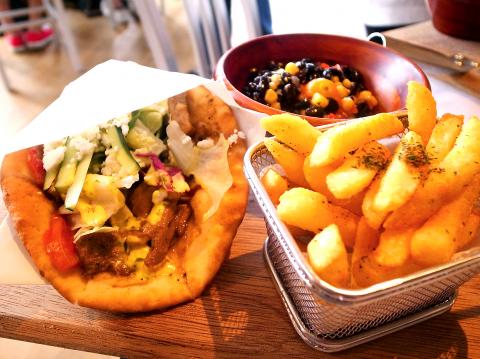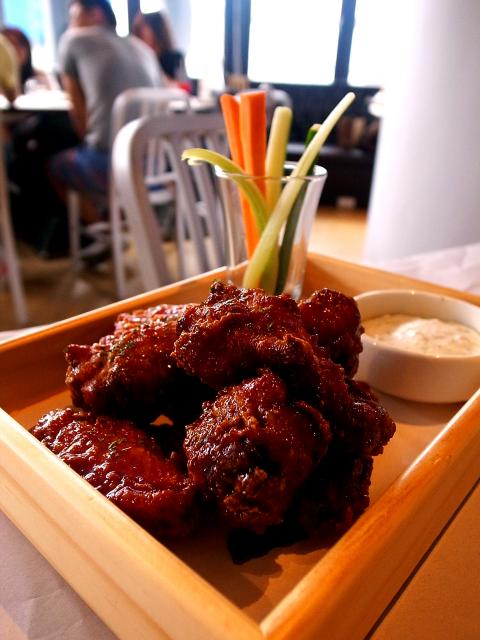Crowded with tourists and teens, Ximending (西門町) doesn’t quickly spring to mind when thinking of places to relax. But with the addition of Amba Taipei (amba意舍), a hotel that opened in February, and its dining outlet Chiba (吃吧), unwinding is on the menu.
A new brand from the Ambassador Hotel Group (國賓飯店集團), Amba Taipei was designed by an international team including Taiwan-born, Bangkok-based interior designer Eugene Yeh (葉裕清), artist Marvin Minto Fang (范姜明道) and Chinese graphic designer Deng Bingbing (鄧兵兵).
The vibe is young and chic. Sunlight streams through a skylight into the lobby, populated by potted trees and flowers, while an array of colorful installation art works vies for attention on the other side of the room. The facilities are playfully and straightforwardly named. Take for example Wenba (問吧) the hotel

Photo: Ho Yi, Taipei Times
counter, which is made out of recycled plastic bottles. In Mandarin the name means “ask.”
This fun-loving spirit continues in Chiba, where the open space is divided not by walls but bookshelves. Toys, games and vintage items such as an old vinyl player are among the knickknacks displayed on the shelves. Books are abundant too and cover a diversity of interests and topics.
The menu offers a compact selection of generously portioned light meals, including soup and salads, at wallet-friendly prices. Service here is more of a casual, do-it-yourself affair. First, diners choose what they want to eat on an order sheet, which is taken to the ring-shaped bar to settle the bill. The dishes are then prepared by a group of young, uniformed cooks, and brought to the table.

Photo: Ho Yi, Taipei Times
Gyros and panini feature predominantly on the menu. The Greek lamb gyro bread (NT$260) is a yummy option made of chewy pita bread filled with tender roast lamb, goat cheese, lettuce, tomato and mint yogurt sauce. The Italian meatball panini (NT$200 for a half serving and NT$320 for full serving), made of mozzarella, basil, beef meatballs and garlic and tomato sauce, is another flavorful sandwich.
For herbivores, the vegetarian gyro bread (NT$240), made of slices of cucumber, yellow and red bell pepper, mozzarella and fresh arugula leaves, is a pleasantly nutty and bitter sandwich.
While the main dishes are mostly pastas, such as spaghetti carbonara with ham (NT$280) and seafood linguine arrabiata (NT$300), appetizers and snacks have a more universal appeal. Items include beer battered fish and chips (NT$180), grilled lamb kebabs with mint yogurt dressing (NT$200) and Korean fried chicken wings (NT$180), which are slightly spicy and sweet and come with a mayonnaise dipping sauce.
The beverage menu contains only nonalcoholic drinks, including freshly squeezed juice (NT$100 to NT$130), teas (NT$120 to NT$150) and coffees (NT$80 to NT$140).
Tipplers should check out the hotel’s lounge bar, Tingba (聽吧), where vinyl records are used as curtains, and jeans and amplifiers are made into decorative art.

In the March 9 edition of the Taipei Times a piece by Ninon Godefroy ran with the headine “The quiet, gentle rhythm of Taiwan.” It started with the line “Taiwan is a small, humble place. There is no Eiffel Tower, no pyramids — no singular attraction that draws the world’s attention.” I laughed out loud at that. This was out of no disrespect for the author or the piece, which made some interesting analogies and good points about how both Din Tai Fung’s and Taiwan Semiconductor Manufacturing Co’s (TSMC, 台積電) meticulous attention to detail and quality are not quite up to

April 21 to April 27 Hsieh Er’s (謝娥) political fortunes were rising fast after she got out of jail and joined the Chinese Nationalist Party (KMT) in December 1945. Not only did she hold key positions in various committees, she was elected the only woman on the Taipei City Council and headed to Nanjing in 1946 as the sole Taiwanese female representative to the National Constituent Assembly. With the support of first lady Soong May-ling (宋美齡), she started the Taipei Women’s Association and Taiwan Provincial Women’s Association, where she

It is one of the more remarkable facts of Taiwan history that it was never occupied or claimed by any of the numerous kingdoms of southern China — Han or otherwise — that lay just across the water from it. None of their brilliant ministers ever discovered that Taiwan was a “core interest” of the state whose annexation was “inevitable.” As Paul Kua notes in an excellent monograph laying out how the Portuguese gave Taiwan the name “Formosa,” the first Europeans to express an interest in occupying Taiwan were the Spanish. Tonio Andrade in his seminal work, How Taiwan Became Chinese,

Mongolian influencer Anudari Daarya looks effortlessly glamorous and carefree in her social media posts — but the classically trained pianist’s road to acceptance as a transgender artist has been anything but easy. She is one of a growing number of Mongolian LGBTQ youth challenging stereotypes and fighting for acceptance through media representation in the socially conservative country. LGBTQ Mongolians often hide their identities from their employers and colleagues for fear of discrimination, with a survey by the non-profit LGBT Centre Mongolia showing that only 20 percent of people felt comfortable coming out at work. Daarya, 25, said she has faced discrimination since she